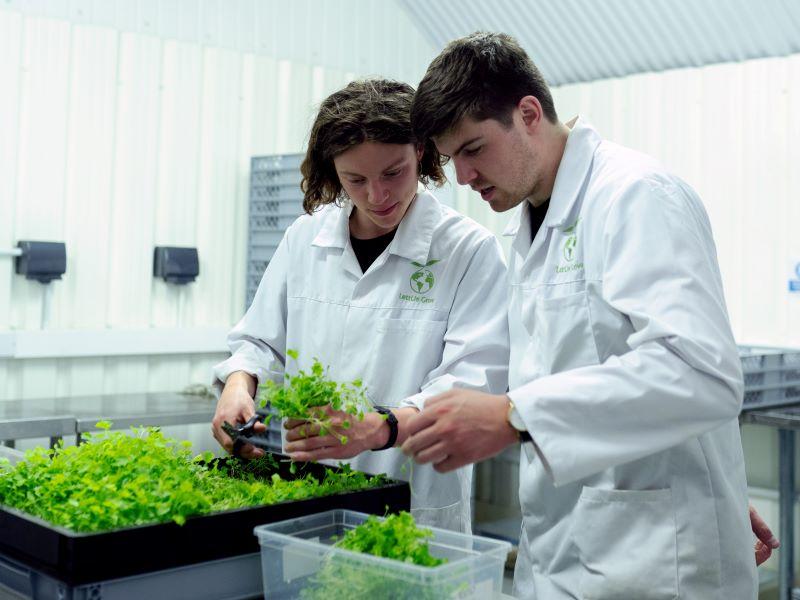
Equitable international research collaboration is possible – find out how

You may also like
Today’s world is interconnected, and in the education space, the pursuit of knowledge knows no borders. However, as researchers increasingly collaborate across continents, bringing together diverse minds from different cultural and academic backgrounds, the challenge of ensuring equity in these partnerships is paramount.
The University of Leeds and the University of Pretoria are testament to the ability to create a mutually beneficial, collaborative research partnership – in this case, one formed around expertise in food security and climate-smart agriculture.
The ARUA Centre of Excellence in Sustainable Food Systems, hosted by the University of Pretoria, and the University of Leeds Global Food and Environment Institute boast complementary strengths in food systems research. Since 2019, the institutions have cooperated to find socially just, climate-smart solutions to the global challenge of delivering safe and nutritious food for all.
More than 58 per cent of research papers regarding current challenges associated with African climate have no African authors. To address this, the collaboration has strengthened African researchers’ capacities to conduct food systems research, translating evidence into policy solutions and interventions to support UN Sustainable Development Goals (SDG) targets. The team has also evaluated the medium- to long-term implications of food system change in southern Africa.
As the partnership flourished, the two universities sought to capitalise on other areas of research collaboration. With the world’s biggest radio telescope – the Square Kilometre Array – being built in South Africa, the team spotted an opportunity to embed training of African students and postgraduates through the pioneering radio astronomy project, Development in Africa with Radio Astronomy (Dara), into their partnership.
- Spotlight guide: THE Awards 2024 – resources the best in UK and Irish higher education
- The secret to long-term international research projects is trust and transparency
- Community-engaged research can give a voice to marginalised people
To date, more than 500 students, including 30 master’s and 10 PhDs, have taken part in Dara activities. Leeds and Pretoria links have continued to develop, incorporating other African countries into a pan-African data science and AI hub given how essential these have become to all global challenges.
Although the relationship has evolved strategically and practically, it has also faced steep challenges. One key issue relates to sustainability – in the broadest sense. We know that African vice-chancellors place significant value on data science and AI for economic growth across the African continent. The joint data science and AI hub in Leeds has identified degrees that could be made available, but we can’t afford to waive fees for these degrees, especially in the current economic climate. This means that we’re stuck in the model of only being able to provide education to those who can pay for it, even when these are disadvantaged students in the Global South. Despite this, through our partnership with Pretoria, we continue to search for ways to make changes so that higher education becomes more equitable across the board.
So, based on the relationship with the University of Pretoria, what is the basis for a successful collaborative research partnership?
Collaboration and partnership should be based as much on friendship and trust as they are on research and “business need”. With this foundation, academics and colleagues in professional services will often go the extra mile to keep partnerships on track. Staff in Leeds are driven by a belief that the partnership will develop into a blueprint for a new kind of south-north partnership that is more equitable and driven by shared values that will make a positive difference to the world – not only to our respective universities.
Use your respective strengths and be open to how that manifests itself. For the University of Leeds, this meant calling on its International Strategy Fund – £7 million allocated over five years – which enables international collaborations and partnerships to exist while we identify the means to sustain them. The fund is geared towards research and teaching focused on the UN SDGs, so it is both meaningful and financially rewarding. Institutions in the Global South cannot match this financially but, in return, the University of Pretoria has made in-kind contributions in the form of time for researchers, postdocs and administrators to prioritise the partnership. Its Future Africa campus has also been instrumental in enabling us to bring pan-African and UK teams together for discussion and planning.
Not surprisingly, funding is an issue, so institutions in the north need to be creative. While schemes such as the Global Challenges Research Fund and Newton have been cancelled, opportunities are available elsewhere, such as through Horizon Europe and the UK’s International Science Partnerships Fund. Working with your advancement and major donor teams is also essential to generate those unique moments for engagement.
Above all, it’s a “whole university” approach – bottom-up meets top-down – with everybody getting on board. At most universities, layers of advocacy for international partnerships are essential to their success:
- Academics need a supportive head of school and faculty dean to allow the time and space to persevere with joint research. For us, this ethos has enabled wider academic colleagues to step up as volunteer mentors on various schemes.
- Other offices involved in international and student work should seek opportunities to align their activities with your work, for example, study abroad and virtual exchanges, to forge a deeper, wider-ranging partnership.
- Advancement functions also have a key role to play to identify and target opportunities for philanthropic funding.
- Research and innovation service directors and the deputy vice-chancellor for research and innovation can support by recognising the time teams need to support the research development of the partnership despite the difficult external funding landscape.
Manuel Barcia is dean of global development at the University of Leeds.
The University of Leeds was shortlisted for International Collaboration of the Year in the Times Higher Education Awards 2024 #THEAwards. A full list of shortlisted candidates can be found here.
If you would like advice and insight from academics and university staff delivered direct to your inbox each week, sign up for the Campus newsletter.


